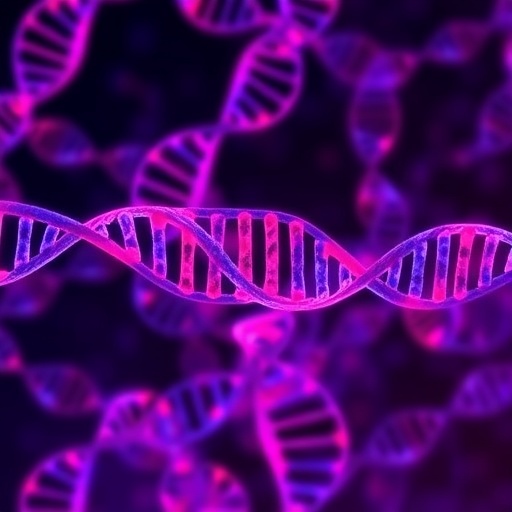In a groundbreaking study poised to reshape the landscape of precision oncology, researchers have conducted the largest pan-cancer analysis focusing on homologous recombination deficiency (HRD) and homologous recombination repair (HRR) gene alterations within a sizable Asian cohort. Published in BMC Cancer, this comprehensive investigation sheds new light on the genomic intricacies underlying multiple solid tumor types and suggests transformative implications for targeted cancer therapies.
Homologous recombination deficiency, a critical biological phenomenon where the cellular machinery fails to properly repair double-strand DNA breaks, has been previously associated with improved responses to platinum-based chemotherapies and PARP inhibitors. These therapeutic avenues have been notably effective in BRCA-mutated cancers such as ovarian, breast, prostate, and pancreatic malignancies. However, the full extent of HRD’s landscape across diverse tumor types and its genetic drivers remained insufficiently explored, particularly in non-Western populations.
This study, leveraging clinical and genomic data from a robust cohort of 9,262 patients spanning 17 distinct solid tumor types, employed the OncoScreen™ Plus kit for high-resolution genetic profiling. By assessing HRD scores alongside biallelic alterations in homologous recombination repair and tumor suppressor genes, the researchers unraveled complex patterns that diverge across various cancers, yet reveal convergent molecular themes.
One of the pivotal revelations is that HRD scores exhibit a broad spectrum of variation across cancer types, with a long-tailed distribution pattern consistently observed. Remarkably, 21.3% of all cases harbored pathogenic alterations in HRR genes, and 13.7% exhibited HRD scores surpassing the critical threshold of 42—a data point often correlated with heightened genomic instability and potential therapeutic vulnerability.
Delving deeper, the study categorizes chromosomal events—namely loss of heterozygosity (LOH), large-scale state transitions (LST), and telomeric allelic imbalance (TAI)—that characterize HRD. These genomic signatures not only highlight shared alterations across multiple cancers but also uncover cancer-type-specific chromosomal arm level patterns. This dual nature suggests a complex interplay between universal DNA repair deficiencies and unique tumor evolutionary trajectories.
The genetic underpinnings pinpoint biallelic loss of key HRR genes such as BRCA1, BRCA2, RAD51D, RAD51C, and PPP2R2A as strongly correlated with increased HRD scores, particularly in classical BRCA-associated cancers. Conversely, in tumors not traditionally linked to BRCA mutations, alterations in genes like BARD1, RAD51D, RAD54L, BRCA1, and MRE11 emerged as notable contributors to HRD, broadening the horizon of genomic vulnerabilities exploitable for targeted therapy.
An intriguing aspect of the research is the role of TP53 biallelic alterations, which exhibited a significant relationship with elevated HRD scores irrespective of HRR gene status. This finding underscores TP53’s multifaceted influence on genomic stability and raises critical questions about its interplay with DNA repair pathways across cancer types.
Clinical correlations drawn from the data reveal that higher HRD scores are predisposed toward tumors in advanced stages, older patient populations, metastatic disease, and those expressing PD-L1 positivity. Notably, tumors characterized as non-microsatellite instability-high (non-MSI-H) and non-POLE mutated showed strong associations with increased genomic instability indices, including structural chromosomal instability (SCIN), weighted genome instability index (WGII), and whole-genome doubling (WGD). These links frame HRD as a driver of aggressive tumor phenotypes and a potential biomarker for treatment stratification.
Beyond descriptive genomics, the authors emphasize the translational potential of their findings. The systematic pan-cancer approach not only affirms the prevalence and complexity of HRD across multiple solid tumors but also proposes tailored testing strategies that could expand the use of HRD-based targeted therapies in Asian populations, historically underrepresented in genomic research.
The study represents a significant vault forward in unraveling population-specific genetic landscapes of cancer. It challenges the prevailing paradigms, which have predominantly centered on Western cohorts, by revealing critical nuances in HRD prevalence and genetic alterations among Asian patients, a demographic representing a large and diverse patient base worldwide.
This research further stresses the necessity for integrating comprehensive genomic profiling in oncology practices to refine patient selection for PARP inhibitors and platinum-based chemotherapy regimens. Such approaches promise to maximize therapeutic benefit, minimize unnecessary toxicity, and ultimately, improve patient outcomes in precision oncology.
Moreover, the pan-cancer lens provides a broader perspective on homologous recombination repair pathway dysregulation, extending beyond traditionally recognized cancers to include a spectrum of solid tumors. This expansive view not only enhances our understanding of tumor biology but offers new avenues for drug development targeting the DNA repair machinery.
Overall, the findings herald a new chapter in oncological genomics, reinforcing the fundamental role of HRD in cancer pathogenesis and therapy while advocating for large-scale, population-specific studies to disentangle the complex genetic architecture of tumors worldwide.
As the field of genomic medicine continues to evolve, this extensive dataset and its nuanced revelations act as a beacon for future research endeavors and clinical innovation. The implications are far-reaching, from refining diagnostic HRD assays to expanding the clinical indications for targeted therapeutics.
Ultimately, this comprehensive pan-cancer study in an Asian cohort provides a rigorous scientific foundation and a call to action for clinicians and researchers alike to harness HRD insights in combating cancer’s global burden with precision and efficacy.
Subject of Research: Pan-cancer analysis of homologous recombination deficiency (HRD) and homologous recombination repair (HRR) gene alterations across solid tumors in a large Asian patient cohort.
Article Title: Pan-cancer analysis of homologous recombination deficiency and homologous recombination repair–associated gene alterations in solid tumors from a large Asian cohort
Article References:
Ren, L., Yao, R., Hou, T. et al. Pan-cancer analysis of homologous recombination deficiency and homologous recombination repair–associated gene alterations in solid tumors from a large Asian cohort. BMC Cancer 25, 946 (2025). https://doi.org/10.1186/s12885-025-14267-w
Image Credits: Scienmag.com




